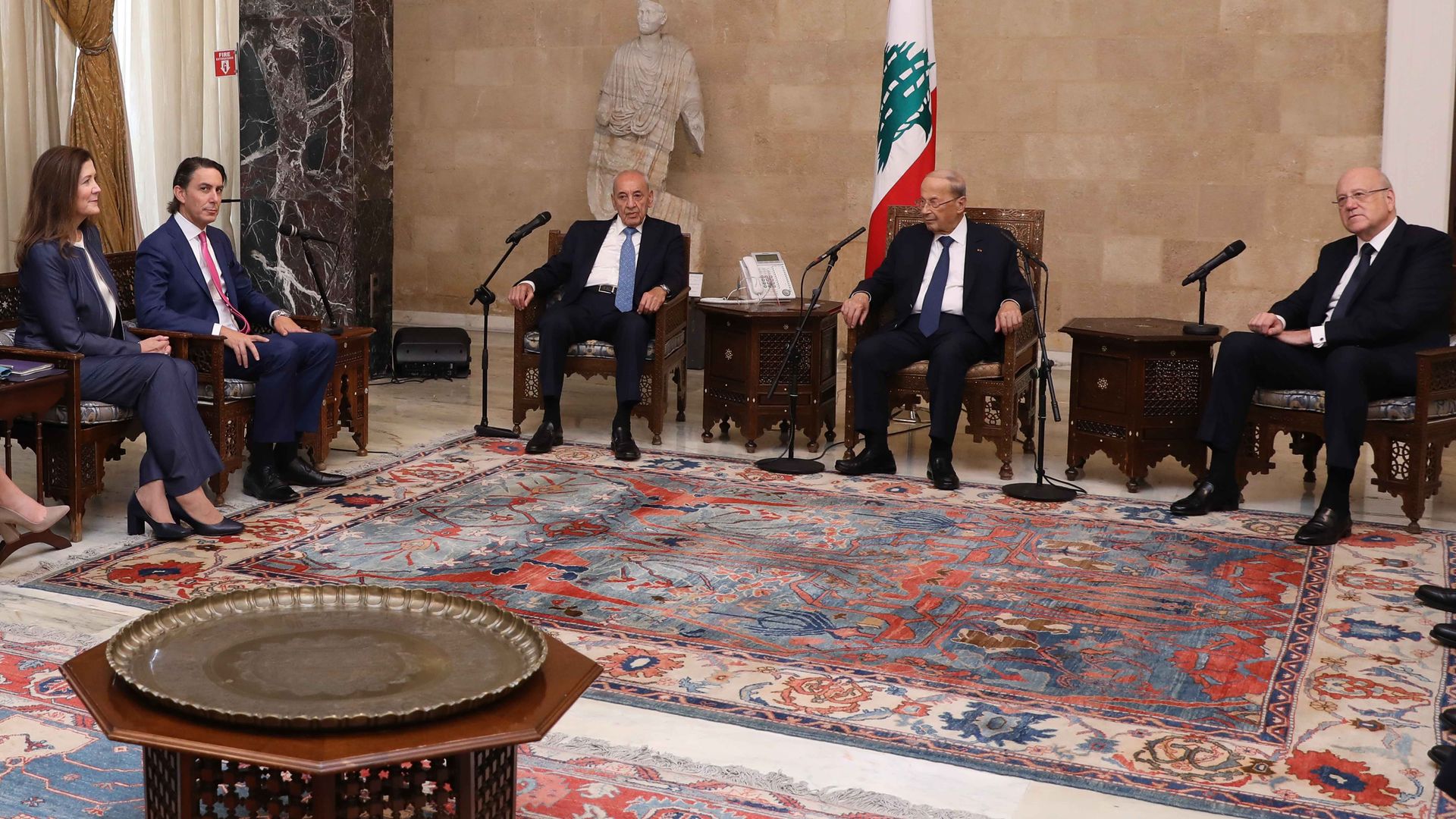U.S. says "gaps" narrowing between Israel and Lebanon in maritime dispute
Add Axios as your preferred source to
see more of our stories on Google.

U.S. senior adviser for energy security Amos Hochstein meets with Lebanese President Michel Aoun, Prime Minister Najib Mikati and Parliament Speaker Nabih Berri at Baabda Palace in Beirut, Lebanon, on Aug. 1. Photo: Lebanese Presidency/Handout/Anadolu Agency via Getty Images
Israeli, Lebanese and Biden administration officials appeared upbeat about the possibility of reaching a deal on the maritime border dispute between Israel and Lebanon after another round of U.S. mediated indirect talks this week.
Why it matters: The dispute is focused on a potentially gas-rich, 330-square-mile area of the Mediterranean Sea off of Israel and Lebanon. The revenues from future natural gas production there could reach billions of dollars.
- But with a major Israeli gas project in the Mediterranean set to come online this fall, Hezbollah leader Hassan Nasrallah has threatened war if Lebanon's rights are not preserved. Israel, Lebanon and the Biden administration want to get an agreement as soon as possible to avoid an escalation.
Driving the news: U.S. envoy Amos Hochstein, who is mediating between the parties, arrived on Sunday in Beirut for another round of talks with Lebanon’s senior military and political leadership.
- On Monday morning, Hochstein held a meeting with President Michel Aoun, Prime Minister Najib Mikati and Speaker of Parliament Nabih Berri to discuss the latest Israeli proposal to settle the dispute. The meeting was the first time Hochstein met with all three Lebanese political leaders together and signaled there's a political consensus in Lebanon about the need to reach a deal.
- Late Monday, Hochstein traveled secretly to Israel for a meeting with Israeli caretaker Prime Minister Yair Lapid and the Israeli negotiation team.
State of play: During the meeting with Hochstein, the three Lebanese leaders rejected Israel’s demand to get one of the potential gas fields in the disputed area in return for compromise on another potential gas field, according to reports in the Lebanese press.
- Aoun, Mikati and Berri also refused a proposal for sharing the potential revenue with Israel or holding a joint gas production effort in part of the disputed area, claiming it was the equivalent of normalization with Israel.
- A U.S. official said the gaps remaining are mostly about the division of the different “blocs” in the disputed area, but stressed it is solvable because “nobody wants things to get out of control."
What they're saying: Although there are still gaps, Berri and several other senior Lebanese officials expressed optimism about the possibility of reaching a deal.
- Lebanese Foreign Minister Abdallah Bou Habib said after Hochstein left Lebanon that there was “significant progress” in the talks.
- Elias Bou Saab, the deputy speaker of the Lebanese parliament, who also attended the meeting with Hochstein said the gaps were narrowed and added that everybody left the meeting happy. “We expect to see results in the next few weeks."
- Hochstein said in an interview with LBC television in Lebanon on Monday that the aim of his meetings was to narrow the gaps.
- “We narrowed the gaps before we got here and I think we made some progress today as well and I hope we can continue to make that kind of progress," Hochstein said.
What’s next: The Israeli security cabinet is going to convene on Wednesday for a briefing on the status of the negotiations.
- Hochstein is expected to return to the region within two weeks to continue the talks with both parties, Lebanese and Israeli officials said.
